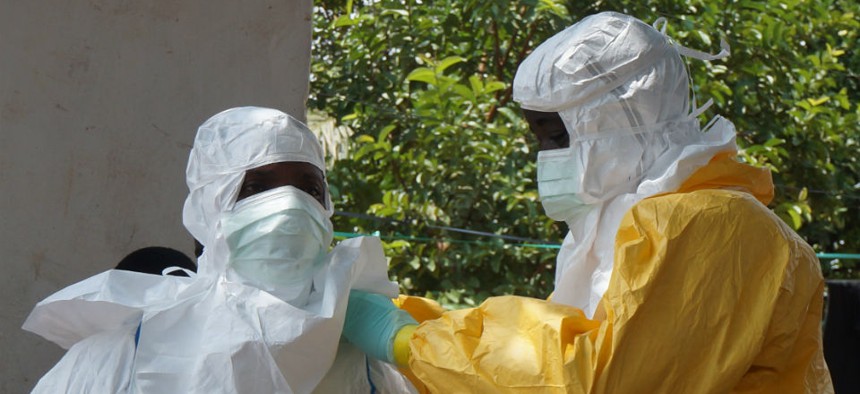
The district of Kailahun in eastern Sierra Leone was put under quarantine at the beginning of August, due to the Ebola outbreak in West Africa. Flickr user Cyprien Fabre/EC ECHO
Why There Won't Be an Ebola Outbreak in the United States
The circumstances that contributed to West Africa's epidemic do not exist in the U.S.
Remember Outbreak?
Good. Now forget about it, because, contrary to popular—and panicky—belief, what happened inthe 1995 disaster film won't happen in the United States now that the nation has its first-ever case of the Ebola virus.
The infected patient, who has not been identified, is being treated at a Dallas hospital, 11 days after he arrived in the U.S. on a commercial flight from Liberia. That country is at the heart of an Ebola outbreak in West Africa, the deadliest since the virus was discovered in 1976. More than 6,200 people have been infected this year, and at least 2,917 of them have died, according to the latest numbers from the World Health Organization.
Yes, the virus itself is scary. There's no vaccine for it. There's no cure. It's fatal in patients 60 percent of the time when it's caught early, and 90 percent when it's discovered too late. An outbreak of the size and scope as the one in West Africa is a reality for the citizens of the affected countries. For Americans, it's fiction.
Aside from a possible "handful" who came in contact with the patient in Dallas, people in the U.S. have not come into contact with the blood, vomit, sweat, feces, or any other bodily fluids of a person infected with Ebola, which is how the virus spreads. Nor do the conditions that contributed to the spread of West Africa's outbreak exist to a serious degree in the U.S. Here are some of those circumstances.
Many people in West Africa don't understand the Ebola virus and how it spreads. Scientists know little about where Ebola originates and how exactly it spreads, and the average citizen in West Africa knows even less. Some people have avoided seeking treatment, fearing that medical workers are the ones spreading the virus. Physicians and other health care professionals have been threatened with knives and stones, and some villagers have attempted to block nearby roads to keep medical teams out. In some parts of the region, people think that just saying "Ebola" aloud makes the disease appear, according to The New York Times.
Liberia, Guinea, and Sierra Leone had never seen a case of Ebola until this year. Whatever instructive materials their governments drafted to educate their people about the virus, they made completely from scratch.
Stateside, the Centers for Disease Control and Prevention and other health agencies have repeatedly explained Ebola and how it spreads, even though the risk that anyone here will contract the disease is extremely small.
Some West African burial practices are not like those in the U.S. When someone sick with Ebola dies in West Africa, his or her body is not taken to a funeral home, placed in a coffin, and buried six feet under. Local tradition often calls for family members to wash, touch, and kiss the bodies of their loved ones. Sometimes, the burial mats they use are saved for future burials. People infected with Ebola are most contagious when they're dead, which means the healthy people disposing of their bodies are at serious risk of exposure.
The affected West African nations don't have the kind of public health education resources the U.S. does. Nearly every public restroom in America bears a sign that warns customers and employees alike to wash their hands before exiting. But many hygiene measures deemed standard here are not common in the remote villages of the nations at the heart of the Ebola outbreak. To teach locals about practicing good hygiene, volunteers have gone door-to-door and handed out informational pamphlets and flyers, reports IRIN, a United Nations humanitarian news service. They've posted helpful information on Facebook and Twitter, and have worked with cell-phone companies to send text messages in local languages.
The affected nations lack the basic health care infrastructure needed to treat patients, let alone contain the virus. There's not much doctors can do for Ebola patients aside from alleviating their symptoms, providing intravenous fluids, maintaining their blood pressure, and treating other infections if they arise. But even such care, considered routine in U.S. hospitals, is difficult to provide in West Africa. The affected countries simply don't have the medical supplies and personnel to stop the virus. Many health centers there don't have enough beds for patients, let alone high-tech isolation wards and protective gear for their employees.
Any potential Ebola cases in the U.S. should be taken seriously. And they are, by the CDC and other well-resourced organizations, which have, more so than others, what it takes to curtail an outbreak.
NEXT STORY: Who Exactly Underestimated ISIS?







